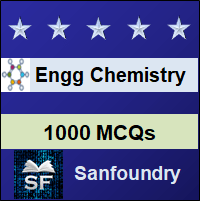
Engineering Chemistry - II Multiple Choice Questions Highlights
- 1000+ Multiple Choice Questions & Answers (MCQs) in Engineering Chemistry - II with a detailed explanation of every question.- These MCQs cover theoretical concepts, true-false(T/F) statements, fill-in-the-blanks and match the following style statements.
- These MCQs also cover numericals as well as diagram oriented MCQs.
- These MCQs are organized chapterwise and each Chapter is futher organized topicwise.
- Every MCQ set focuses on a specific topic of a given Chapter in Engineering Chemistry - II Subject.
Who should Practice Engineering Chemistry - II MCQs?
– Students who are preparing for college tests and exams such as mid-term tests and semester tests on Engineering Chemistry - II.- Students who are preparing for Online/Offline Tests/Contests in Engineering Chemistry - II.
– Students who wish to sharpen their knowledge of Engineering Chemistry Subject.
- Anyone preparing for Aptitude test in Engineering Chemistry.
- Anyone preparing for interviews (campus/off-campus interviews, walk-in interview and company interviews).
- Anyone preparing for entrance examinations and other competitive examinations.
- All - Experienced, Freshers and College / School Students.
Engineering Chemistry - II Chapters
Here's the list of chapters on the "Engineering Chemistry - II" subject covering 100+ topics. You can practice the MCQs chapter by chapter starting from the 1st chapter or you can jump to any chapter of your choice.- Fuels and Combustion
- Water and its Treatment
- Chemical Analysis of Water
- Refractories
- Ceramics
- Drugs and Dyes
- Nuclear Fuels and Nuclear Power Generation
- Corrosion, Electrolysis, Fuel Cells and Batteries
- Corrosion
- Electroplating
- Industrially Important Materials
- Surface Chemistry
1. Fuels and Combustion
The section contains multiple choice questions and answers on fuel classification and characteristics, calorific value of solid and non-volatile liquid fuels, gaseous and volatile liquid fuels, solid fuels, coal characteristics and its analysis, coal technology, pulverised coal, secondary solid fuels, liquid fuels, petroleum, liquified petroleum gas, knocking, anti knocking agents, gaseous fuels, petrochemicals, octane and cetane number, combustion and fuel gas problems, combustion efficiency and calculations.
2. Water and its Treatment
The section contains questions and answers on hardness of water and boiler feed water, lime soda process, zeolites, calgon conditioning, alkalinity of water and reverse osmosis.
|
|
|
3. Chemical Analysis of Water
The section contains MCQs on water specification, cooling water, heavy water and rain water harvesting.
|
|
|
4. Refractories
The section contains multiple choice questions and answers on refractories classification, properties and manufacturing.
|
|
|
5. Ceramics
The section contains questions and answers on clays, silica, feldspars, ceramic wave fabrication, ceramic products and glazes.
|
|
|
6. Drugs and Dyes
The section contains MCQs on ideal drug requirement, drug classification, antibiotics, vitamin c, dye requisites and classification.
|
|
|
7. Nuclear Fuels and Nuclear Power Generation
The section contains multiple choice questions and answers on nuclear binding energy, nuclear fission, nuclear power reactors and its components, reactor concepts, breeder reactor, nuclear waste disposal, fission grade uranium production, controlled thermonuclear reactors and thermonuclear power generation environmental aspects.
|
|
|
8. Corrosion, Electrolysis, Fuel Cells and Batteries
The section contains questions and answers on causes and effects of corrosion, wet theory corrosion, faraday’s law, fuel and galvanic cells.
|
|
|
9. Corrosion
The section contains MCQs on dry and wet corrosion types, galvanic types, aeration and boiler corrosion, corrosion prevention, cathodic and anodic protection, corrosion inhibitors, pourbaix diagram and electroless plating.
|
|
|
10. Electroplating
The section contains multiple choice questions and answers on electroplating applications, electroplating equipment and operating conditions, electroplating baths and electroplating wastes characteristics.
|
|
|
11. Industrially Important Materials
The section contains questions and answers on soaps, detergents, lubricants, oils and fats.
|
|
|
12. Surface Chemistry
The section contains MCQs on catalysts, catalysis reactions, adsorption, colloids applications and preparation.
|
|
|
Wish you the best in your endeavor to learn and master Engineering Chemistry - II!
